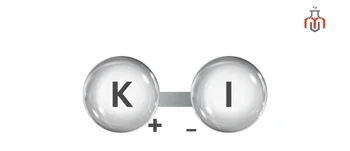
Potassium iodide is an inorganic metal halide compound, composed of potassium (K⁺) and iodide (I⁻) ions. It is a stable, bioavailable source of iodine, an essential trace element for the synthesis of thyroid hormones. Potassium iodide is added to fortified foods and is also used in radiation emergency tablets, cough syrups, disinfectants, dyes, and in the treatment of iodine deficiency.
Potassium iodide is listed as an essential medicine and is available as a generic and over-the-counter medication.

CAS No.: 7681-11-0
Synonyms: Thyro-Block, Kali iodide, Knollide, Kisol, Kalii iodidum, Asmofug E, Kali iodatum, Kaliumiodid
| Physical Properties | |
| Nature | Slightly hygroscopic |
| Molecular weight | 166.0028 g/mol |
| Solubility | Highly soluble in water, slightly soluble in ethanol |
| Odor | Odorless |
| Taste | Saline and slightly bitter |
| Density | 1.7 g/cm3 |
| Chemical Properties | |
| Color | White |
| State | Solid |
| Boiling point | 1323 °C |
| Melting point | 681 °C |
| pH | 7-9 |
| Refractive Index | 1.677 |
| Shelf life | Stable in dry air, decomposes in light and moisture |
| Pictograms : |
|
| Hazard Statements : | H302 Harmful if swallowed. H315 Causes skin irritation. H319 Causes serious eye irritation. H372 Causes damage to organs (Thyroid) through prolonged or Repeated exposure if swallowed. |
| Precautionary statements : | P260 Do not breathe dust/fume/gas/mist/vapours/spray P264 Wash skin thoroughly after handling. P270 Do not eat, drink, or smoke when using this product. P314 Get medical advice/ attention if you feel unwell. P501 Dispose of contents/container to an approved waste disposal plant. P305 + P351 + P338 IF IN EYES: Rinse cautiously with water for several minutes. Remove contact lenses, if present, and easy to do. Continue rinsing. |
Potassium iodide is an inorganic metal halide compound, composed of potassium (K⁺) and iodide (I⁻) ions. It is a stable, bioavailable source of iodine, an essential trace element for the synthesis of thyroid hormones. Potassium iodide is added to fortified foods and is also used in radiation emergency tablets, cough syrups, disinfectants, dyes, and in the treatment of iodine deficiency.
Potassium iodide is listed as an essential medicine and is available as a generic and over-the-counter medication.

CAS No.: 7681-11-0
Synonyms: Thyro-Block, Kali iodide, Knollide, Kisol, Kalii iodidum, Asmofug E, Kali iodatum, Kaliumiodid
| Physical Properties | |
| Nature | Slightly hygroscopic |
| Molecular weight | 166.0028 g/mol |
| Solubility | Highly soluble in water, slightly soluble in ethanol |
| Odor | Odorless |
| Taste | Saline and slightly bitter |
| Density | 1.7 g/cm3 |
| Chemical Properties | |
| Color | White |
| State | Solid |
| Boiling point | 1323 °C |
| Melting point | 681 °C |
| pH | 7-9 |
| Refractive Index | 1.677 |
| Shelf life | Stable in dry air, decomposes in light and moisture |
| Pictograms : |
|
| Hazard Statements : | H302 Harmful if swallowed. H315 Causes skin irritation. H319 Causes serious eye irritation. H372 Causes damage to organs (Thyroid) through prolonged or Repeated exposure if swallowed. |
| Precautionary statements : | P260 Do not breathe dust/fume/gas/mist/vapours/spray P264 Wash skin thoroughly after handling. P270 Do not eat, drink, or smoke when using this product. P314 Get medical advice/ attention if you feel unwell. P501 Dispose of contents/container to an approved waste disposal plant. P305 + P351 + P338 IF IN EYES: Rinse cautiously with water for several minutes. Remove contact lenses, if present, and easy to do. Continue rinsing. |
Low doses of potassium iodide available in food products and supplements are generally safe. However, it is not recommended as a regular supplement. It is important to consult a medical expert before taking in use.
Potassium iodide is essential for the regulation of iodine to the thyroid gland, which is essential for producing thyroid hormones that help in metabolism, growth, and brain development. It also protects the thyroid gland from accidental radiation.
Potassium iodide is generally considered safe when taken as directed. However, people with a thyroid disorder, like Graves’ disease, or a toxic nodular goiter, and a serious skin condition like dermatitis herpetiformis should avoid the use of potassium iodide.
Potassium iodide should be used with care. If it comes in contact with skin or eyes, rinse with water for 10–15 minutes. Always refer to the Safety Data Sheet (SDS) for detailed safety precautions. Individuals with a known sensitivity to iodine should consult a healthcare professional before use.